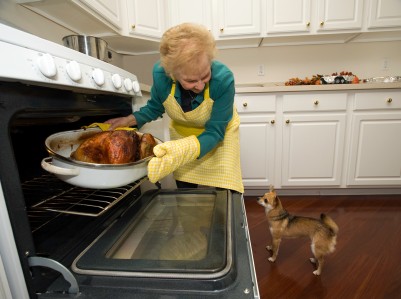By following a few rules, you can prevent an emergency trip to the vet for your animals.
By Lisa King
Pet Safety During the Holidays
During the holidays, especially on Thanksgiving, which is food-focused, keep in mind that although canines and humans area both omnivores, their digestions and dietary requirements are very different. Those roasted pearl onions you love can make your dog anemic. Your favorite chocolate cream pie will make her very sick. And cooked poultry bones can splinter and cause abdominal perforations.
Canines do have something in common with sharks, however. Most dogs will eat pretty much anything. My sister has found everything from wine corks to rubber bands to Legos in her Chesapeake Bay Retriever’s poop. When the dog ate a bunch of grapes and half an onion left on the counter, the vet had to induce vomiting. If your dog is a land shark like this, you must be extra vigilant at Thanksgiving if you want to avoid spending the day at the emergency vet clinic. Here are some tips to keep her safe:
- Make sure your kitchen garbage container has a tight-filling lid. There are plenty of tempting morsels being thrown away this time of year—yummy stuff like turkey bones and skin that your dog would love to get at.
- Carefully dispose of all the plastic bags, clips,and ties that the turkey came in; they smell of meat and are very appealing to dogs.
- Don’t put appetizers on low coffee tables. A dining table, counter or something of similar height should be safe, unless you own a large dog. In any case, don’t leave food unattended.
- Exercise and feed your dog on her normal schedule. Take a long walk before guests arrive so she’s tired out and not too active.
- Buy her a new and interesting toy—perhaps one you can fill with treats—to keep her happy while you eat your Thanksgiving feast.
- When guests are coming and going, be sure your dog can’t run out the door.
- Put her bed in a quiet room where she can retreat if the party gets to be too much for her.
- Ask your guests not to feed your dog human food, no matter how adorable she is when she begs. Provide safe treats that guests can give her.
- Put leftovers away in the fridge promptly. If you’re in a postprandial stupor, you might not pay attention to what your dog is scavenging off the table.
- Keep decorations out of your dog’s reach. Wreaths, bunting, scented candles, decorative gourds and small pumpkins are all tempting to a curious dog.
- Many types of flowers are poisonous to dogs. Keep arrangements well out of reach.
Here are some holiday no-nos that are either toxic, too fatty or otherwise dangerous to your dog:
- Xylitol or other artificial sweeteners
- Chocolate
- Onions, garlic, shallots, or other members of the allium family
- Butter, turkey skin, or other fats
- Raw turkey
- Cooked poultry bones
- Uncooked bread dough
- Raw fish
- Raw eggs
- Foods with lots of herbs
- Gravy
- Corn on the cob
- Marshmallows
- Grapes and raisins
- All alcoholic beverages
- Coffee, tea or anything else with caffeine in it
Your dog can have a few treats on the big day. It’s OK for her to have small amounts of these foods:
- Turkey meat
- Plain mashed white potatoes
- Plain sweet potatoes
- Plain green beans
- Plain carrots
- Plain loose corn
- Cranberry sauce (if it’s not too sweet)
- Pumpkin pie (hold the whipped cream)
If you want to give her a bit of turkey, put a few pieces of well-cooked skinless, boneless white meat on top of her regular food.Do the same with small amounts of the other allowed foods. Whatever you do, don’t feed her from the table. That will encourage her to beg at dinner every night.
About the Author: Lisa King is a freelance writer living in Southern California. She is the former managing editor of Pet Product News International, Dogs USA, and Natural Dog magazines. Lisa is also the author of the well-received murder mystery novel “Death in a Wine Dark Sea.”





